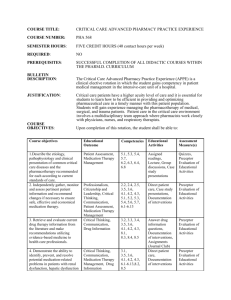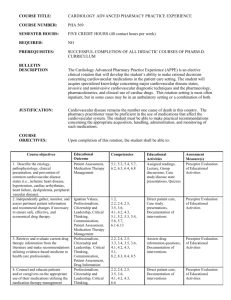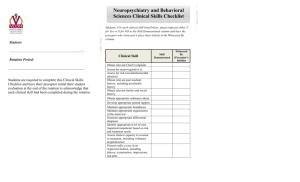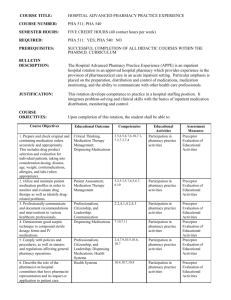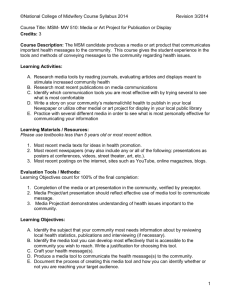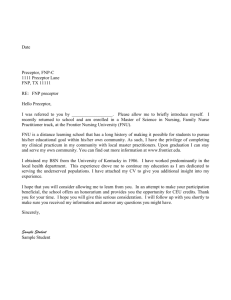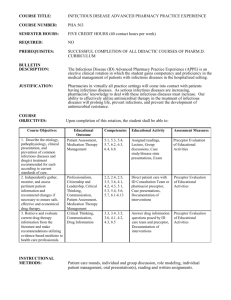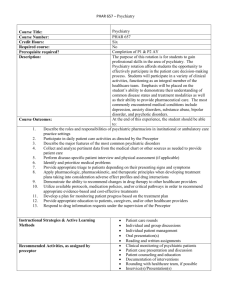PHA 570 Psychiatry APPE - Creighton University School of
advertisement
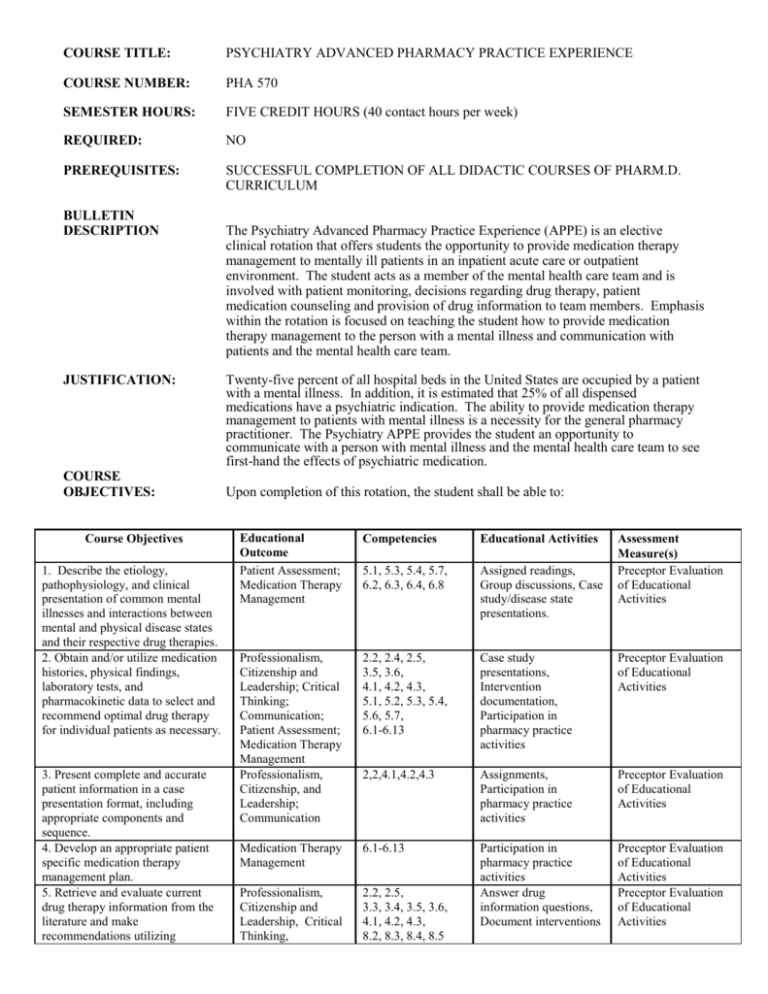
COURSE TITLE: PSYCHIATRY ADVANCED PHARMACY PRACTICE EXPERIENCE COURSE NUMBER: PHA 570 SEMESTER HOURS: FIVE CREDIT HOURS (40 contact hours per week) REQUIRED: NO PREREQUISITES: SUCCESSFUL COMPLETION OF ALL DIDACTIC COURSES OF PHARM.D. CURRICULUM BULLETIN DESCRIPTION JUSTIFICATION: COURSE OBJECTIVES: Course Objectives 1. Describe the etiology, pathophysiology, and clinical presentation of common mental illnesses and interactions between mental and physical disease states and their respective drug therapies. 2. Obtain and/or utilize medication histories, physical findings, laboratory tests, and pharmacokinetic data to select and recommend optimal drug therapy for individual patients as necessary. 3. Present complete and accurate patient information in a case presentation format, including appropriate components and sequence. 4. Develop an appropriate patient specific medication therapy management plan. 5. Retrieve and evaluate current drug therapy information from the literature and make recommendations utilizing The Psychiatry Advanced Pharmacy Practice Experience (APPE) is an elective clinical rotation that offers students the opportunity to provide medication therapy management to mentally ill patients in an inpatient acute care or outpatient environment. The student acts as a member of the mental health care team and is involved with patient monitoring, decisions regarding drug therapy, patient medication counseling and provision of drug information to team members. Emphasis within the rotation is focused on teaching the student how to provide medication therapy management to the person with a mental illness and communication with patients and the mental health care team. Twenty-five percent of all hospital beds in the United States are occupied by a patient with a mental illness. In addition, it is estimated that 25% of all dispensed medications have a psychiatric indication. The ability to provide medication therapy management to patients with mental illness is a necessity for the general pharmacy practitioner. The Psychiatry APPE provides the student an opportunity to communicate with a person with mental illness and the mental health care team to see first-hand the effects of psychiatric medication. Upon completion of this rotation, the student shall be able to: Educational Outcome Patient Assessment; Medication Therapy Management Competencies Educational Activities 5.1, 5.3, 5.4, 5.7, 6.2, 6.3, 6.4, 6.8 Assigned readings, Group discussions, Case study/disease state presentations. Professionalism, Citizenship and Leadership; Critical Thinking; Communication; Patient Assessment; Medication Therapy Management Professionalism, Citizenship, and Leadership; Communication 2.2, 2.4, 2.5, 3.5, 3.6, 4.1, 4.2, 4.3, 5.1, 5.2, 5.3, 5.4, 5.6, 5.7, 6.1-6.13 Case study presentations, Intervention documentation, Participation in pharmacy practice activities Preceptor Evaluation of Educational Activities 2,2,4.1,4.2,4.3 Assignments, Participation in pharmacy practice activities Preceptor Evaluation of Educational Activities Medication Therapy Management 6.1-6.13 Professionalism, Citizenship and Leadership, Critical Thinking, 2.2, 2.5, 3.3, 3.4, 3.5, 3.6, 4.1, 4.2, 4.3, 8.2, 8.3, 8.4, 8.5 Participation in pharmacy practice activities Answer drug information questions, Document interventions Preceptor Evaluation of Educational Activities Preceptor Evaluation of Educational Activities Assessment Measure(s) Preceptor Evaluation of Educational Activities evidence-based medicine to health care professionals. 6. Identify, prevent, and resolve potential drug-related problems through the monitoring of basic pharmacokinetic and pharmacodynamic parameters. 7. Counsel and educate patients and/or caregivers on the appropriate use of their medications utilizing the medication therapy management principles when possible. INSTRUCTIONAL METHODS: ACTIVE LEARNING METHODS: REQUIRED ACTIVITIES: Communication, Drug Information Medication Therapy Management Professionalism, Citizenship and Leadership, Communication, Medication Therapy Management, Drug Information 6.2,6.7,6.10,6.11 Participation in pharmacy practice activities Preceptor Evaluation of Educational Activities 2.2, 2.4, 2.5, 4.1, 4.2, 4.3, 6.6 8.2, 8.5 Documentation of interventions, Participation in pharmacy practice activities Preceptor Evaluation of Educational Activities Patient care rounds, individual and group discussions, role modeling, individual patient management, oral presentation(s), reading and written assignments. Patient care rounds, individual and group discussions, role modeling, individual patient management, and oral presentation(s). Clinical monitoring of psychiatric patients Patient case presentation and discussion ADDITIONAL ACTIVITIES AS DIRECTED BY THE PRECEPTOR: Patient counseling and education Inservice(s)/Presentation(s) Exams/Quizzes Projects GRADING: Grading for this rotation will be established by the preceptor based on the following: Attendance, attitude, and professional attire Professionalism, ethics and responsibility Communication and interpersonal skills Presentation of patient information Demonstration of pharmacotherapeutic skills (including patient assessment and monitoring, therapeutic decision-making, and intervention), and integration of basic biomedical, pharmaceutical and clinical science knowledge to optimize patient care outcomes. Demonstration of critical thinking skills Documentation of interventions Daily activities Case presentation(s) Written/oral presentation(s) Quizzes/Examination(s) Project(s) A failure on any dimension or assignment is grounds for failure of the rotation. Specific evaluation criteria will be presented to the student within 48 hours from initiation of the rotation. A final grade is assigned according to the following grading scale. Grades will not be rounded: 100-90 A < 90 and ≥ 85 B+ < 85 and ≥ 80 B < 80 and ≥ 75 < 75 and ≥ 70 < 70 C+ C F The final grade will be weighted in the following way: 10% Patient Assessment 40% Medication Therapy Management 20% Communication Skills 5% Drug Information 5% Professionalism, Ethics, Responsibility 20% Rotation Specific Projects/Assignments Unprofessional and/or unethical behavior will not be tolerated, and will be grounds for immediate failure of the rotation, and/or dismissal from the program. An unexcused absence, including excessive tardiness, is grounds for failure of the rotation. EXAMINATIONS: Students arriving late for an examination/quiz will receive a zero. This may result in failure of the rotation. Students who are unable to take an examination/quiz as scheduled due to circumstances deemed “excusable” by the instructor, must make arrangements to make up the examination/quiz as soon as possible. Students must notify the preceptor of an impending absence prior to the exam. The determination as to whether the reason for absence is excusable lies solely with the preceptor. Students who are unable to take an examination/quiz due to circumstances deemed “non-excusable” by the instructor will receive a grade of zero. This may result in failure of the rotation. INSTRUCTOR: Director, Office of Experiential Education Associate Director, Office of Experiential Education Paul Price, Pharm.D., BCPP TEXT(S): None. Readings will be assigned by the individual preceptor. **The latest policies, including those regarding students with disabilities and misconduct can be found on the School's web site at http://spahp.creighton.edu/Acad_SAffairs/policies.asp. Each student is responsible for becoming familiar with all of the latest policies. “Faculty reserve the right to make changes in the course that they deem necessary, and will provide a copy of such changes to the Pharmacy Program Curriculum Committee for review before the next offering of the course.”
